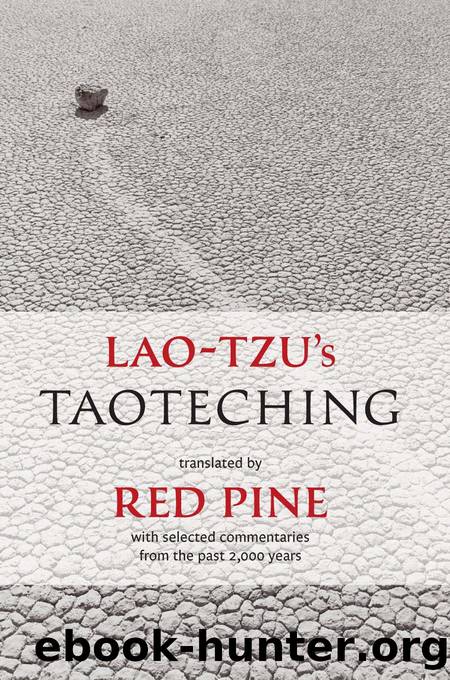Lao-tzu's Taoteching by Lao Tzu

Author:Lao Tzu [Lao Tzu]
Language: eng
Format: epub
Publisher: Copper Canyon Press
Published: 2012-12-17T16:00:00+00:00
42
The Tao gives birth to one
one gives birth to two
two gives birth to three
three gives birth to ten thousand things
ten thousand things with yin at their backs
yang in their embrace
and breath between for harmony
what the world hates
to be orphaned widowed or destitute
kings use for their titles
thus some gain by losing
others lose by gaining
what others teach
I teach too
tyrants never choose their death
this becomes my teacher
HO-SHANG KUNG says, “The Tao gives birth to the beginning. One gives birth to yin and yang. Yin and yang give birth to the breath between them, the mixture of clear and turbid. These three breaths divide themselves into Heaven, Earth, and Humankind and together give birth to the ten thousand things. These elemental breaths are what keep the ten thousand things relaxed and balanced. The organs in our chest, the marrow in our bones, the hollow spaces inside plants all allow these breaths passage and make long life possible.”
LI HSI-CHAI says, “The yang we embrace is one. The yin we turn away from is two. Where yin and yang meet and merge is three.”
LU HUI-CH’ING says, “Dark and unfathomable is yin. Bright and perceptible is yang. As soon as we are born, we all turn our back on the dark and unfathomable yin and turn toward the bright and perceptible yang. Fortunately, we keep ourselves in harmony with the breath between them. ”
THE YUNCHI CHICHIEN says, “When breath is pure, it becomes Heaven. When it becomes turgid, it becomes Earth. And the mixture of the breath between them becomes Humankind.”
TE-CH’ING says, “To call oneself ‘orphaned,’ ‘widowed,’ or ‘destitute’ is to use a title of self-effacement. Rulers who are not self-effacing are not looked up to by the world. Thus, by losing, they gain. Rulers who are only aware of themselves might possess the world, but the world rebels against them. Thus, by gaining, they lose. We all share this Tao, but we don’t know it except through instruction. What others teach, Lao-tzu also teaches. But Lao-tzu surpasses others in teaching us to reduce our desires and to be humble, to practice the virtue of harmony, and to let this be our teacher.”
CHIAO HUNG says, “Those who love victory make enemies. The ancients taught this, and so does Lao-tzu. But Lao-tzu goes further and calls this his own ‘teacher.’”
KAO HENG says, “According to the Shuoyuan (10.25), ‘Tyrants never choose their death’ was an ancient saying, which Confucius attributed to the Chinjenming. This is what Lao-tzu refers to when he says ‘what others teach.’”
WANG P’ANG says, “Whatever contains the truth can be our teacher. Although tyrants kill others and are the most hated of creatures, we can learn the principle of creation and destruction from them.”
In line seven I have followed Mawangtui A, which has chung (between) in place of the usual ch’ung (empty). Lines nine and ten are echoed in verse 39. In line thirteen, I have incorporated ku (thus) from Mawangtui A. And in line fourteen, several Tunhuang copies add yi (justly), while Mawangtui A has yi (thoughtfully).
Download
This site does not store any files on its server. We only index and link to content provided by other sites. Please contact the content providers to delete copyright contents if any and email us, we'll remove relevant links or contents immediately.
| Confucianism | Feng Shui |
| I Ching | Jainism |
| Karma | Shintoism |
| Sikhism | Tao Te Ching |
| Taoism | Tibetan Book of the Dead |
| Zoroastrianism |
The Tao of Physics by Fritjof Capra(1848)
The Diamond Cutter by Geshe Michael Roach(1671)
Feng Shui by Stephen Skinner(1616)
Human Design by Chetan Parkyn(1574)
The Alchemy of Sexual Energy by Mantak Chia(1490)
Tao Te Ching by Lao Tzu(1485)
365 Tao: Daily Meditations by Ming-Dao Deng(1301)
Tao Tantric Arts for Women by Minke de Vos(1260)
Sun Tzu's The Art of War by Giles Lionel Minford John Tzu Sun(1246)
Karma-Yoga and Bhakti-Yoga by Swami Vivekananda(1221)
Sidney Sheldon (1982) Master Of The Game by Sidney Sheldon(1187)
Buddhism 101 by Arnie Kozak(1185)
The Analects of Confucius by Burton Watson(1145)
The Art of War Other Classics of Eastern Philosophy by Sun Tzu Lao-Tzu Confucius Mencius(1140)
The New Bohemians Handbook by Justina Blakeney(1104)
Tao te ching by Lao Tzu(1077)
The Way of Chuang Tzu by Thomas Merton(1070)
The Sayings Of by Confucius(1027)
Bless This House by Donna Henes(990)
